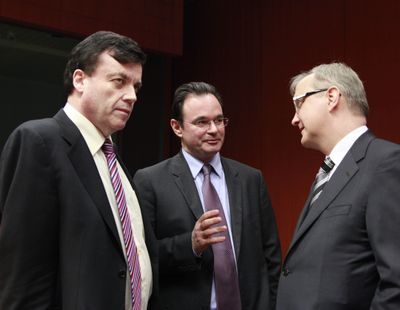Irish official, dead at 52, transcended politics

DUBLIN, Ireland – To understand how the Irish felt about former finance minister Brian Lenihan, who died Friday at 52 after an 18-month battle with pancreatic cancer, consider this: In the Irish general election held last February, Lenihan’s centrist Fianna Fail party lost 18 seats in the Dublin region.
In other words, in the worst electoral rout of its history, in the entire Dublin region which returned 47 deputies to Ireland’s parliament, only one Fianna Fail candidate managed to retain his seat: Brian Lenihan.
By any rational account, Lenihan should have been swept out of office. A furious electorate judged his colleagues across the country, particularly in Dublin, not as much harshly as with vengeance. Lenihan was the finance minister who, alongside Prime Minister Brian Cowen, decided to extend a massive 400 billion-euro guarantee over the banking system in September 2008, effectively nationalizing the banking sector’s debt.
It was Lenihan who, after weeks of denial, had to announce the national humiliation of seeking aid from the International Monetary Fund and the European Union. It was Lenihan who had to present and enforce the massive, draconian cuts in public spending as part of the EU/IMF 85 billion-euro bailout. It was Lenihan who had to thank the United Kingdom, Ireland’s former colonial master, for their 7 billion GBP contribution to the mismanaged Irish state. In any other country, national pride would have left Lenihan despised, certainly as much as his party colleagues.
Lenihan, a lawyer by profession, managed to combine an impeccable party pedigree (both his father and grandfather were deputies for the party, with Lenihan winning his seat in the same district when his father died) with an intellectual vigor above the norm in Irish politics.
Indeed, in a party that at times frowns on individuals with too expansive an education, Lenihan stood out with his Cambridge degree. Such an achievement was as quick to raise suspicion in the party as it was to impress. Yet it contributed to his image, in a time of massive financial crisis, as a leader with a cut above the usual Chicago ward boss level of ability that prevailed within the Fianna Fail parliamentary party.
His resolute defense of the banking guarantee and belief that a failure to act as he did would have led to a national banking collapse and civil breakdown has never been totally dismissed, even by his political opponents.
Finally, there was the cancer. Lenihan’s ability to communicate in a forthright manner, in a way Cowen failed spectacularly to do, was enhanced by a feeling that the Dublin West deputy was no longer just an ordinary politician. Brian Lenihan became more than a mere politician. Instead, he was someone who had nothing to gain or lose by being anything other than the minister who was going to make the decisions he believed were in the common interest.
The fact that Lenihan was asked to speak at the commemoration of the death of Michael Collins, a hero of the civil war and the opposition (now governing) Fine Gael party, cemented the perception that he was almost above party politics. It would be a lot like the Republicans asking Nancy Pelosi to speak at an event commemorating Ronald Reagan.